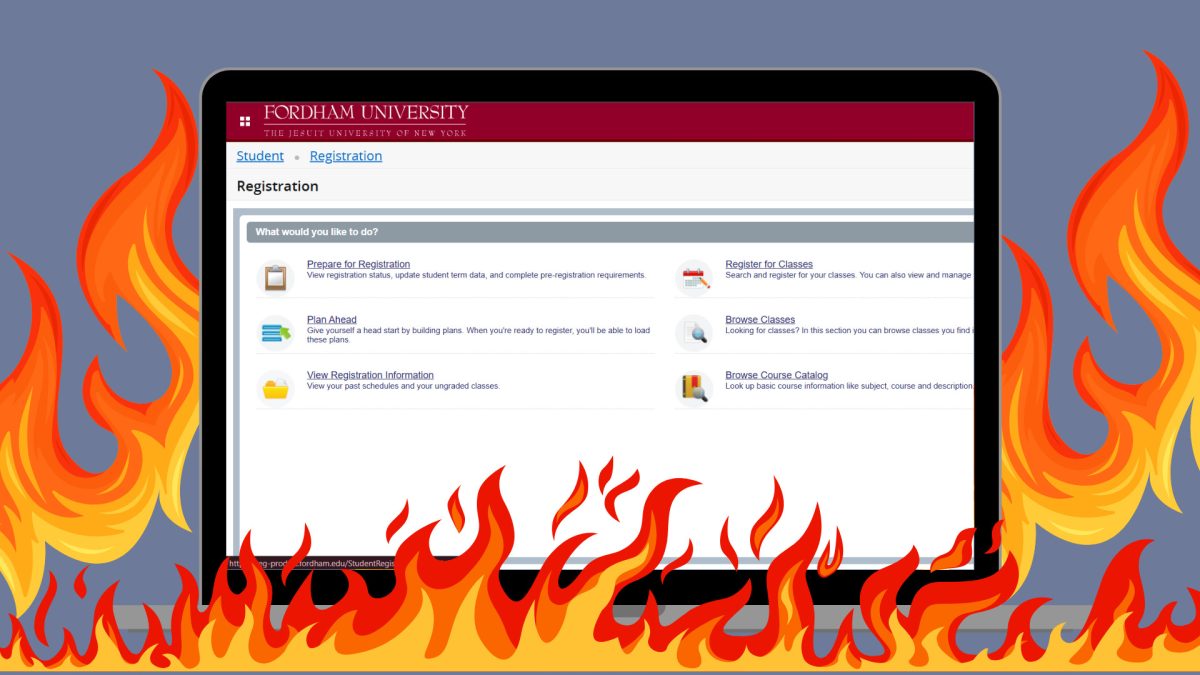During our undergraduate experience, students will have to register for classes at least eight different times, twice per academic year. That’s eight cycles of rolling the dice and hoping to get the ideal schedule. Most students spend some time cross-referencing between their Degree Works and the Plan Ahead interface. “Clunky” would be an understatement in describing that interface. Even when students have familiarity with it, it’s still a thing that they dread.
Class registration for the Fall 2025 semester started on March 24, and will continue through April 15. Students register in stages according to how many credits they’ve earned. Additionally, student athletes, members of Fordham University Emergency Medical Services or ROTC and students currently studying abroad get priority registration. However, the weirdest part of this is the distinction by the letter that your last name starts with.
For students with 0-35 credits earned, their registration group is divided into two. Each group has a different registration date depending on the starting letter of the student’s last name. This distinction is only for this group, and not for the group of students who have earned 36-59 credits, 60-82 credits and above 83 credits. I assume this split-up is in place for the first-year students since it’s most likely the largest year of students at Fordham. However, it’s not advantageous for the first years who are more likely to miss one of their classes simply because of what letter their last name starts with. It comes down to luck on whether or not you’ll be a round one register or not, although the last name initials that go first swap from the fall to the spring semester.
Another gripe students have with this system is how different the interface of searching for classes is depending on how you find them. If you try to find a class from the Catalog Search, you’ll have more options than you would if you did from Plan Ahead. In Catalog Search, you can filter classes by meeting dates, name of professor, campus and filter between whether the section is open or not. When trying to find classes with Plan Ahead, the section where you build a schedule that you can instantly register with when your registration date arrives, you do not get these features in trying to filter between these classes. It results in students going back and forth between tabs, trying to find the same section that they want to register for.
While I don’t have gripes with my advisor, Ms. Alcobar Ramirez, (love you, Jumirna!) I’ve heard students express disapproval of their advisors stating that they haven’t been the biggest help in trying to figure out what classes they should take the following semester. We all know what we need to take thanks to Degree Works, but a little guidance on balancing these classes from our advisors would go a long way, hence the title “advisor.” But in their defense, there are only 18 academic advisors and 11,000 of us. We should put that increased tuition towards more advisors so we can avoid this whole problem. If students have more access to their advisors, they can properly have the support needed to try to get into the classes they need in a timely and almost stress-free manner.
The biggest problem with registration is the website crashes. It does not matter how much work you’ve put into making the most pristine, beautiful, efficient schedule you’ve made if you get an error message when it’s time to press register. I had to get rid of my original Eloquentia Perfecta 1 course this semester because I received an error message when I pressed register and had to find a quick substitute. It doesn’t matter how badly you need a class — if you get an error message while registering, you may be out of luck for that semester or have to hope someone drops the class so you can have a shot at grabbing a seat.
So does this system work? Not at all. The interface we use to register is flawed, our advising system needs reworking (or just more staff, for that matter) and the distribution of registration dates falls down to luck for the freshman class. For a school charging 4.65% more on tuition, 4.3% on room fees and 4% on meal plans, I really hope the extra money coming out of our pockets goes towards helping the general infrastructure of the school.
Gabriel Capellan, FCRH ’28, is a journalism major from the Bronx, New York.









































































































































































































